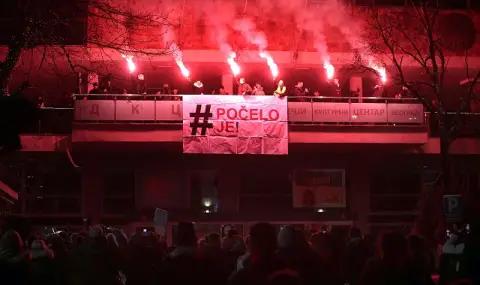Students are currently the most legitimate political force in Serbia, says a professor from Belgrade about the student protests that started in Novi Sad. What are their goals and how are they so well organized?
"Dear professors, we inform you that the blockade of the Faculty of Philosophy has begun" - with this announcement, sounded from a megaphone on November 2, 2024, the wave of student blockades at the University of Novi Sad, Serbia began.
Olga Pantic, a first-year communications student, was on shift in the university cafeteria at the time. But as soon as she found out what was happening, she immediately joined her fellow students. Since then, the faculty has become her home: it is where she eats, sleeps and lives. "I got so used to it that I actually feel better here than at home", she tells DV.
From the very beginning, the students made it clear what they wanted: to seek political and criminal responsibility for the collapse of the canopy at the entrance to the Novi Sad train station in November last year, when 15 people died and two others were seriously injured.
Later, students from other faculties joined the protest initiative, wanting to organize their own blockades. "Some faculties even held their first meetings with us", recalls student Tatjana Rasic. After a few more weeks, almost the entire university had risen in protest.
Perfect coordination
Before, the students' main concern was to arrive on time for morning lectures and submit their term papers without delay. Now, however, the blockade is their main task. Decisions are made on the principle of direct democracy - they are voted on at plenary meetings. And for individual activities - for example, logistics, public relations or the provision of hygiene materials, special teams are responsible.
Olga Pantić is a representative of her faculty on the team responsible for student security. This group manages the protests, stops traffic, directs the protest marches and makes sure that everything is peaceful.
"We have coordinators and delegates. Each coordinator has a transmitter with which he communicates and uses it to tell the delegates what to do, when to move, when to stop. We all act in sync, we listen to each other," she explains to DW.
Security and safety are a priority
After numerous physical attacks on demonstrators, the security team formed a special unit known as the "Beavers".
"The Beavers" wear motorcycle gear and helmets to protect themselves in the event of car attacks. In fact, they are the first to block the path of cars if necessary.
Each faculty has its own security team that monitors who enters and exits the building. Engineering students have developed an app to monitor participants and stop uninvited guests.
"These [uninvited guests] are people who have caused problems, whether by insulting others, spying on us, or leaking information from plenary sessions. We coordinate this activity throughout the university: those on the blacklist of a faculty cannot enter other faculties," explains Pantić.
"A harder but fairer path"
The students are proud of the fact that their meetings are open to anyone who wants to participate and that all decisions of the student movement are made by majority vote at these meetings. Sometimes hundreds of students attend these meetings, and the debates can last for hours, as everyone has the right to speak and contribute.
"It may be exhausting, but we do not believe in representative democracy. We have seen its shortcomings: when individuals represent us, there is always room for corruption and personal scores. We do not want this. "We chose the harder, but more honest and fairer path," student Nemanja Kurčić told DW.
What's next for the protest movement?
The pop-up Madonna wrote on Instagram that the biggest student protest since 1968 is taking place in Serbia. Some analysts tend to agree with this.
The student movement helped spark protests in almost all municipalities in Serbia, joined by teachers, lawyers, medical professionals and many representatives of the IT sector. The protests have already led to the resignation of Serbian Prime Minister Miloš Vučević and Novi Sad Mayor Milan Đurić.
"Students are the most legitimate political force in the country right now", says Ognjen Radonjic, a professor at the Faculty of Philosophy in Belgrade. "If they decide to create their own political platform - regardless of the form - it would have a real chance of success."
Distrust and caution
For now, students remain extremely distrustful of members of all opposition structures in Serbia - from activist groups and NGOs to political parties. They also reject proposals such as the formation of a transitional government that would ensure institutional stability and conditions for fair elections.
"I don't think anything should be imposed on them right now", Radonjic told DW. "I believe they will mature for this over time. We should let them be that way. They are afraid of outside influences and infiltration and show some signs of being closed off, but that is understandable given everything they have been through."
The professor believes that the structure of the movement is its greatest strength. "The government has been trying to infiltrate them from the very beginning, but as long as they make decisions collectively, these embedded elements have no influence. Moreover, they have no leaders, so the government has no one to bribe or publicly discredit."
Nevertheless, possible ways to overcome the crisis are already being discussed in plenary meetings. But above all, the students expect their demands to be met. Because without this, they say, there can be no hope for justice in Serbia.
